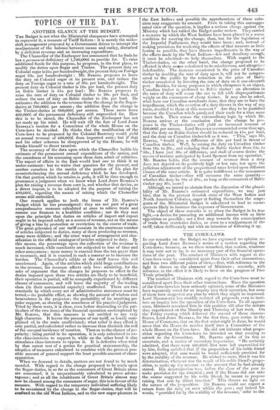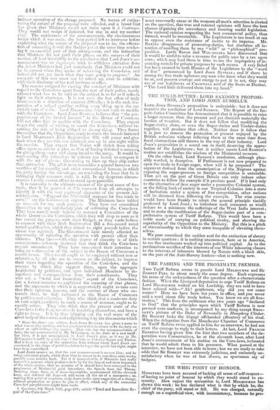THE CORN-LAWS.
IN our remarks on the Budget we have expressed no opinion regarding Lord JOHN RUSSELL'S notice of a motion regarding the Corn-laws ; because, as we there remarked, that motion, whatever it may turn out to be, is no necessary part of the financial operations of the year. The conduct of Ministers with regard to the Corn-laws must be considered apart from their other transactions, and from two different points of view,—first, with reference to the light it throws on the character of Ministers ; secondly, with reference to the effect it is likely to have on the progress of Free Trade principles. The conduct of Ministers with regard to the Corn-laws must be considered apart from their other transactions. Since the question of the Corn-laws has been seriously agitated, some of the Ministers have repeatedly voted for an inquiry into their operation, but none of them have suggested any plan by which they might be improved. Lord MELBOURNE has steadily resisted all proposals even to institute an inquiry into the operation of the Corn-laws. To all appearance, Ministers remained firm in this position till after the defeats they experienced on the Monday and Thursday of last week. On the Friday evening which followed the second of these discomfitures, Lord JOHN RUSSELL, for the first time, gave notice in the House of Commons, that on the first order-night in June, he would more that the House do resolve itself into a Committee of the whole House on the Corn-laws. He did not intimate what proposition regarding the Corn-laws he intended on that evening to submit to the Committee. Mr. BARING spoke of its fate as uncertain, and a matter of secondary importance. "He certainly admitted, that there were 400,000/. that were left unprovided for by him, feeling satisfied that if the proposition of his noble friend were adopted, that sum would be found sufficiently provided for by the stability of the revenue. He wished to state, that it was his determination, whatever Was the result of his noble friend's proposition, to make up the revenue to the amount that he had already stated. His determination was, before the close of the year to make provision for the 400,0001.; and if the House did not take the course suggested by his noble friend, he meant to propose raising that sum by direct taxation." This throws no light on the nature of the proposition. Mr. BARING could not expect a return from the duty on corn within the year ; and indeed his words, "provided for by the stability of the revenue," refer to the Indirect operation of the change proposed. No means of conjecturing the nature of the proposal were afforded, and a broad hint ki-as given that Ministers would not insist upon it a routrance. They would not resign if defeated, but stay in and try another plan. The suddenness of the announcement, the circumstances under which it was made, the long period left to intervene before explaining what the nature of the proposal was to be, the affectation of connecting it with the Budget yet at the same time rendering it no essential part of that arrangement, and the intimation that Ministers did not peril their places on the success of their motion, all lead irresistibly to the conclusion that Lord JOHN'S announcement was an impromptu trick to withdraw attention from the defeat Ministers had just sustained; that Ministers could not be in earnest when they spoke of reforming the Corn-laws, and indeed did not yet know what they were going to propose.* An escapade of this sort must not be mixed up, even in criticism, with their discharge of the real business of office. The reasons assigned for viewing the conduct of Ministers with regard to the Corn-laws apart from the rest of their policy, nearly exhamt what has to be said on the subject in so far as it reflects light on their character. It is not even the last effort of truly brave men in a situation of extreme difficulty ; it is the rash desperation of a ruined gambler staking every thing upon the uncertain turn of a die. Lord 3IimnounNe does not want to meddle with the Corn-laws. Lord JOHN RUSSELL believes that "the preponderance of the landed interest" in the house of Commons will not allow him to meddle with the Corn-laws. They expect to get the credit of wishing to mend the Corn-laws, without incurring the risk of being obliged to do any thing. They flatter themselves that the Opposition, readyto storm the breach battered in Lord Moargrn's lrish Registration Bill, will pause and give back when they see this new barricade run up in one night within the enceinte. They expect that Tories will shrink from taking office upon so odious a plea as that of having defeated a measure, for giving cheap sugar and cheap bread to the many. It would be representing this subterfuge in colours too heroic to compare it with the act of pirates threatening to blow up their ship rather than surrender. The affair more resembles a quarrel between two worthies of lax morality and strict conventional honour, in which the party having the advantage, on reminding the loser that he is infringing their common code, is told, In my desperate circumstances I really cannot afford to stand upon punctilio. It is necessary to the ultimate success of the great cause of free trade, that it he guarded at this moment from all attempts to identify it with the very equivocal character of the present Administration. "Support the Ministerial measure for free trade in corn ! " cry the Government organs. The Ministers have tabled no measure for any such purpose. They have not committed themselves to any satisfactory plan of reforming the Corn-laws. They have merely made believe to connect a Committee of the whole House on the Corn-laws, which they will drop as soon as it has served the purpose, with their Budget, as they made believe to connect with their Irish Registration Bill a five-pound rated rental qualification, which they raised to eight pounds before the clause was rejected. The Government have merely afforded an opportunity of agitating the question with greater effect than hitherto. They have—with what degree of sincerity is of little consequence—solemnly declared that they think the Corn-laws require amendment. They have announced their intention to bring on a discussion of the subject in the House of Commons a month hence. That month ought to be employed without rest or relaxation, by all who are in earnest on the subject, to impress their views regarding the operation of the Corn-laws, and the reasons by which they support them, upon the aggregate Legislature by petitions, and upon individual Members by de
legations and correspondence from their constituents. They who ask a "total and immediate" repeal of the Corn-laws, (on a former occasion we explained the meaning of that phrase, and the arguments by which it is supported,t) ought to take care that their opinions, reasons, and the number of those who entertain them, be duly intimated to the House of Commons by petition and otherwise. They who think that a moderate duty on corn might justifiably he made a source of revenue, ought to be equally active. They who think that the present state of the Corn-laws is the best, are already bestirring themselves, and have a right to do so. It is by thus bringing out the real sense of the great body of the nation, and enlightening it by the discussions which
• Since the above was written, Lord Jon s RUSSELL has given a name to what was an airy nothing, and has proclaimed that he means to fix the duty on wheat at eight shillings the quarter. That rate has the recommendation of being the one recommended by Mr. APGREcon, in his draft of a new tariff: but then, it is not accompanied, in Lord JOHN'S plan, as it was in Mr. M'GREcon's tariff, by a lowering of the duty on Colonial Sugars and Timber. Had it been so, some of the opposition from without which Lord Join; encountered, in the shape of petitions, before he began his speech last night, might have been neutralized.
Lord JOHN assures us, that the new announcement is no new idea ; and he brings collateral proofs, which show that he meant to do something some weeks, possibly some months back. Yet it is inconceivable, if Ministers had really matured a measure which professes to be by far the largest and most important of the whole session, that no promise of it should have been conveyed in the programme of Ministerial good intentions, the Speech from the Throne. Standing alone, then, as it does—incomplete, unannounced till the eleventh hour, and deferred till June—it still wears all the air of a mancauvre ; or, waiving that point of suspicion, sinks down to the mere suggestion of a change, without preparation or power to give it effect, which any of the numerous Corn-law pamphleteers might have made.
t Spectator, 6th March 1841, page 229; article "Total and Immediate Repeal of the Corn-laws." must necessarily ensue at the moment all men's attention is riveted on the question, that true and rational opinions will have the best chance of gaining the ascendancy and insuring useful legislation. The national opinion respecting the best commercial policy, thus formed, would be irresistible.. The Legislature is too much at sea to oppose even the resistance of inertia to its impetus. Mr. BARING disapproves of protecting-duties, but disclaims all intention of assailing them by any "wild" or "philosophical" proposition. Lords Rims: and WINCRILSEA have discovered that it would be sinful to raise a revenue for public uses by a tax upon corn; which may lead them in time to see the impropriety of increasing rentals for private purposes by such means. A very Babel has been created in both Houses of the Legislature by the "word of fear" pronounced by Lord Joins RUSSELL; and if there be among the free trade agitators any men who know what they would be at, and possess courage and energy to put it in act, they may say of our legislators as CROMWELL said of the Scots at Dunbar, "The Lord hath delivered them into my hand."



























 Previous page
Previous page